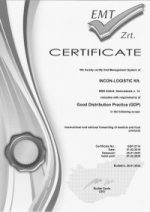Pharmaceuticals
Shipping pharmaceutical products requires responsibility, utmost care, and attention to detail to transport life-saving and sensitive products safely and efficiently.
INCON-LOGISTIC has been actively shipping pharmaceuticals for over 10 years. Our range of services includes shipping both human and veterinary medicine. Our pharmaceutical delivery guidelines, GDP certificate (Good Distribution Practice, which is a quality assurance system comprising guidelines, procedures, and processes necessary to ensure the quality of pharmaceuticals), and our regulations contribute to maintaining high levels of service.
The pharmaceutical industry is highly regulated, and shipping these products presents unique challenges that require expertise in specific requirements and guidelines.
Temperature.
Medicines can be quite sensitive to temperature changes. Mishandling them can seriously impact their efficacy. Therefore, cold chain management or temperature-controlled logistics are given top priority in this respect.
Staff education and training.
Logistics companies shipping pharmaceutical products must ensure that their employees receive proper education and training in the safe handling of such goods. This training should encompass packaging and labeling requirements, emergency procedures, and the correct utilization of personal protective equipment.
Special packaging.
Packaging materials affect the stability of drugs during shipment. They must provide adequate protection against external factors. Therefore, it is essential to use high-quality, special packaging materials to address these issues.
Risk management and contingency planning.
Risk management is a critical factor in drug shipping, given the potential impacts of delays, damage, or product loss. Therefore, transporters should have comprehensive contingency plans in place to provide prompt solutions for unforeseen events.
Documentation and labelling.
Accurate documentation and labelling are essential in shipping pharmaceuticals. Every shipment has to be accompanied by comprehensive documentation, including invoices, certificates of analysis and proof of regulatory compliance.

